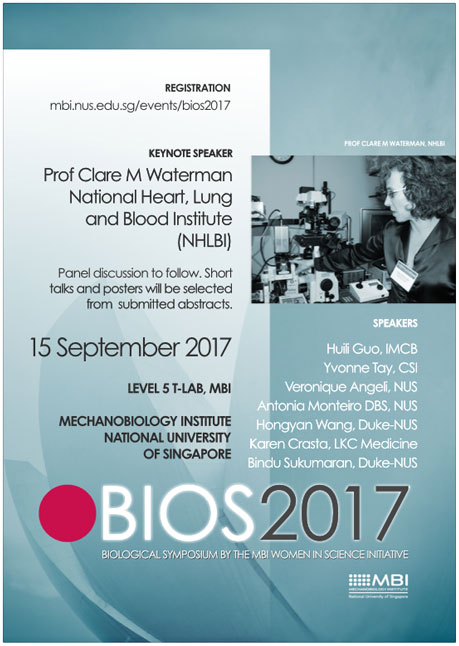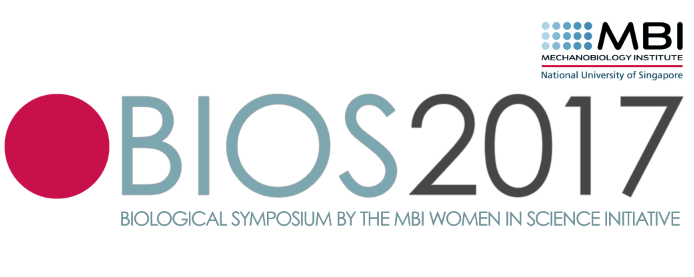
The 2017 BIOS Biological Symposium is brought to you by the Mechanobiology Institute, Singapore (MBI) Women in Science (WIS) Initiative to explore and promote research in biological sciences.
The symposium is free and open to all and we look forward to your participation.
The Mechanobiology Institute (MBI) Women in Science (WIS) is hosting the second of BIOS series, BIOS 2017, on Friday, the 15th of September 2017. This is a free biology symposium that aims to promote biological sciences by bringing together scientists from diverse realms of life sciences research in Singapore. BIOS2017 is a one-of-a kind symposium that will feature work of women researchers from institutes such as NUS, IMCB, CSI, DUKE-NUS, IMB and NTU. With a specific focus on junior careers in academia, BIOS 2017 will also have a panel discussion towards the end of the symposium.
The keynote speaker is Dr Clare M Waterman, an NIH Distinguished Investigator at the Laboratory of Cell and Tissue Morphodynamics, National Heart, Lung and Blood Institute (NHLBI), USA.
Topics in BIOS2017 include:
- Cell signaling
- Cytoskeleton
- Infectious diseases
- Cancer and drug discovery
Speakers
The organizers are honored to welcome the following speakers to present at BIOS 2017: Biological Symposium by the MBI WIS Initiative. The symposium is open to graduate students, post-doctoral fellows, and faculty members interested in all aspects of biological and life sciences.
Featured Speaker
Clare M Waterman, Keynote Lecture
NIH Distinguished Investigator at the Laboratory of Cell and Tissue Morphodynamics, National Heart, Lung and Blood Institute (NHLBI), USA
Clare Waterman is a Distinguished Investigator and head of the Laboratory of Cell and Tissue Morphogenesis at NIH. Her research is focused on the complex, mechanical interactions between organelle systems that are necessary for directed cellular movement.
Key to Dr Waterman’s approach is a willingness to embrace interdisciplinarity to solve complex biological problems. Her laboratory includes cell biologists, physicists, mathematicians, engineers, and mouse geneticists, which she views as critical to achieving her research goals.
Learn more about Dr Waterman’s research
Photo by Tom Kleindinst/MBL

Dr Waterman has made fundamental advances in the understanding of cytoskeletal interactions and has authored or coauthored more than 90 papers. She currently serves on the editorial boards of Current Biology and Journal of Microscopy.
Full Speaker List
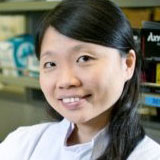
Huili Guo
Institute of Molecular and Cell Biology (IMCB), L’Oreal awardee
Dr Guo’s research uses ribosome profiling to study microRNA-mediated repression in exploring the concept of specialized ribosomes in regulating translation.

Yvonne Tay
Cancer Science Institute of Singapore (CSI)
Dr Tay’s lab focuses developing important insights into previously uncharacterized dimension of RNA:RNA interactions and the discovery of novel oncogenes and/or tumor suppressors, providing potential diagnostic or therapeutic targets.
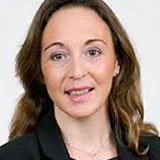
Veronique Angeli
Department of Microbiology, NUS
Dr Angeli’s research focuses on lymphatic vessel biology and function, and evaluating the potential of lead clinical applications via the study of atherosclerosis and atherothrombosis.
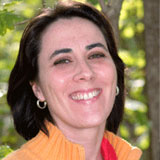
Antonia Monteiro
Department of Biological Sciences, NUS
Dr Monteiro’s lab seeks to understand the evolution of morphological novelties by focusing on the evolution and development of butterfly wing patterns, combining tools from ethology, population genetics, phylogenetics, and developmental biology.
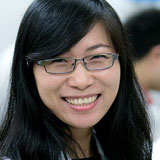
Hongyan Wang
Duke-NUS Neuroscience & Behavioural Disorders Programme
Dr Wang investigates the fundamental issue of self-renewal versus differentiation in stem cell and cancer biology. Her work provides important insights into the molecular mechanisms underlying neural stem cell self-renewal and differentiation and may ultimately contribute to better therapies for various types of cancers including human brain tumors.
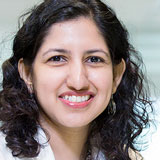
Karen Crasta
LKC School of Medicine, Molecular and Cellular Biology
Dr Crasta’s laboratory is focused on investigating the causes and consequences of abnormal mitotic events on the integrity of the genome. Her research hopes to identify novel cellular targets that could be of relevance to the development of combination therapies to improve sensitization of tumour cells, as well as provide insights into chemoresistance, a major setback in oncology.

Bindu Sukumaran
Duke-NUS, Emerging Infectious Diseases Programme
Dr Sukumaran researches bacterial pathogens, still a major threat to human health in the 21st century. Her laboratory is broadly focused on studying bacterial infection mechanisms, epidemiology, and antibacterial immunity.
Short Talks Speakers
Rupambika Das
Javier Gomez Fernandez group, SUTD
Eugenia Ong
Eng Eong Ooi group, Duke-NUS
Krithi Sethi
Ronen Zaidel-Bar group, MBI NUS
Yang Bo
Michael Sheetz group, MBI NUS
Registration
Registration is now closed.
Programme
BIOS 2017: BIOLOGICAL SYMPOSIUM15 September 2017 |
||
| 09:15-09:30 | Linda Kenney (MBI, NUS) | Welcome Address |
| Session I (Stuti Desai, Chair) | ||
| 9:30 to 10:00 | Bindu Sukumaran (Duke-NUS) | The NLRP3 inflammasome contributes to host protection and immunopathology associated with clinically relevant A. baumannii infection |
| 10:00 to 10:30 | Veronique Angeli (NUS) | Homeostatic vascular function of LYVE-1 expressing macrophage |
| 10:30 to 10:45 | Eugenia Ong (Duke-NUS) | Preclinical evaluation of VIS513, a therapeutic antibody against dengue virus, in non-human primates |
| 10:45 to 11:15 | Coffee Break | |
| Session II (Minnah Thomas, Chair) | ||
| 11:15 to 11:45 | Karen Crasta (LKC School of Medicine) | The senescence paradox in anti-mitotic chemotherapy |
| 11:45 to 12:15 | Huili Guo (IMCB), L’Oréal awardee | Ribosome heterogeneity and translational control |
| 12:15 to 12:45 | Hongyan Wang (Duke-NUS) | An intrinsic mechanism controls reactivation of neural stem cells |
| 12:45 to 13:00 | Rupambika Das (SUTD) | Microfabrication of 3D printed devices for cardiac tissue engineering |
| 13:00 to 14:15 | Lunch, Poster & Exhibition Booths (L’Oréal & Elsevier) | |
| Session III (Lu Xuyao, Iris and Rishita Changede, Chairs) | ||
| 14:15 to 14:45 | Yvonne Tay (CSI) | A microRNA/gene/pseudogene network regulates prostate cancer tumorigenesis |
| 14:45 to 15:15 | Antonia Monteiro (NUS) | The developmental origin of a complex novelty: Butterfly eyespots |
| 15:15 to 15:30 | Kriti Sethi (MBI, NUS) | RHO-1 GEFs RHGF-1 and UNC-73 promote actomyosin contractility in the C. elegans spermatheca |
| 15:30 to 15:45 | Yang Bo (MBI, NUS) | Fixing the faulty rigidity sensing machine in the transformed cells |
| 15:45 to 16:00 | Coffee Break | |
| 16:00 to 16:45 | Clare M Waterman (NIH Distinguished investigator, NHLBI) | Keynote: Integrating actin dynamics and adhesion in cell migration |
| 16:45 to 17:00 | Sarah Huggett (Elsevier) | Career Panel: Gender in the global research landscape |
| 17:00 to 18:00 | Panel discussion | Gender gaps in science Panelists: Clare M Waterman, Dr Vandana Ramachandran (IMB, A*Star), Bindu Sukumaran, Antonia Monteiro, Huili Guo, Yvonne Tay, Sarah Huggett (Elsevier) |
| 18:00- | Concluding Remarks | To follow at L10, MBI, T-Lab: Happy Hour & dinner, Gender Bender photo display |
Location
BIOS 2017 will be held at the Mechanobiology Institute (MBI) on the campus of the National University of Singapore, Singapore.
T-Lab, Level 5 lecture room
5A Engineering Drive 1
National University of Singapore, Singapore, 117411
The Mechanobiology Institute was created through joint funding by the National Research Foundation and the Ministry of Education with the goal of creating a new research centre in mechanobiology to benefit both the discipline and Singapore.
MBI’s primary focus is to identify, measure and describe how the forces for motility and morphogenesis are expressed at the molecular, cellular and tissue level. Toward that goal, we are working to create a common international standard for defining these steps by developing powerful new computational models, experimental reagents, and tools for studying diseases of cells and tissues. Our goal is then to transfer these basic discoveries to both the clinic and the classroom.
Sponsors
The organizers would like to thank the following for their generous support of BIOS 2017, Biological Symposium on Mechanobiology
Corporate Sponsor
The organizers gratefully acknowledge the contribution of our corporate sponsor, L’Oréal.
BIOS 2017 provides an excellent opportunity to showcase the latest products and technologies available to researchers and provide marketing opportunities to companies. Interested sponsors may write to wis-mbi@groups.nus.edu.sg.
